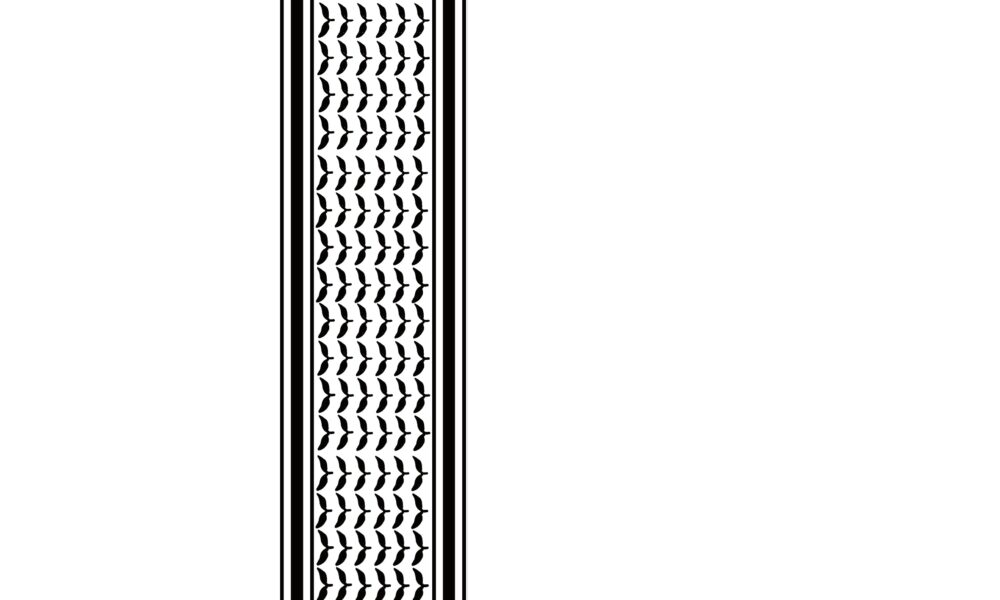Solidarity for Palestinian Human Rights (SPHR) at McGill called on students to wear a keffiyeh on campus on Sept. 5 as a way to show solidarity with pro-Palestinian mobilization. Other pro-Palestinian activist groups from across Montreal joined their call, including SPHR Concordia, Groupe de Solidarité pour les droits humains des Palestiniennes et Palestiniens de l’Université de Montréal, Palestinian Youth Movement Montreal (PYM), and Al Raya Dawson.
In a written statement to The Tribune, SPHR explained that wearing the keffiyeh was a way to continuously draw attention to pro-Palestinian activism on campus.
“The keffiyeh is a visual reminder of the Palestinian struggle—of the ongoing genocide and of the people’s fierce resistance,” SPHR wrote. “The goal for today is to make Palestine unavoidable on the same campuses where our administration continue[s] to fund occupation and genocide and where students have faced brutal repression for simply speaking up. In that sense, it is a small but collectively powerful symbol of resistance.”
The square, chequered scarf, often worn as a headdress, has not always had political connotations. Political science professor Rex Brynen, whose areas of study include comparative politics in the Middle-East, explained that during the late Ottoman period, rural communities in various parts of the Middle East frequently wore keffiyehs around the head, especially ones that were all-white. Keffiyehs were widely used by Arab fighters in the Arab Revolt against Ottoman rule during World War I and were later incorporated into the uniforms of some Arab military forces. Brynen clarified that it wasn’t until the early-to-mid-20th century that the keffiyeh came to be a symbol of Palestinian identity and struggle.
“In Palestine, they became a symbol of resistance to British colonialism in the 1930s and 1940s. With the birth of […] modern Palestinian nationalism after 1948, Yasser Arafat (head of Fatah and the PLO [Palestinian Liberation Organization]) famously wore a black-and-white patterned one, and the chequered keffiyeh became globally associated with Palestinian resistance,” Brynen wrote in a statement to The Tribune.
At McGill, many students wear keffiyehs on a regular basis to continuously signal support for the Palestinian cause. The McGill Media Relations Office (MRO) explained to The Tribune that students have a right to freedom of expression on campus within the university’s limits.
“McGill supports the right to freedom of expression within the boundaries of the law and the University’s policies,” the MRO wrote. “The university is working to ensure an environment where every member of our community feels welcomed, recognized, and capable of sharing views without fear of retribution, regardless of who they are or what perspectives they hold.”
Jordan* explained that some students may not want to participate in protests for fear of academic or professional repercussions, as well as police violence following the police’s use of tear gas during the James Administration occupation and the arrests made at the encampment this summer. Rory* added that wearing a keffiyeh was a way for students to quietly protest outside of demonstrations.
“It’s [a way] to show without words that you do support [Palestine] […] because a lot of people do support it, but they are scared,” Rory said.
Jordan drew a connection between the keffiyeh and the newly planted grass that pro-Palestinian protestors tore out of the lower field on Aug. 30, noting that, to them, both were a symbol of resistance.
“It’s the same thing as the keffiyeh [….] People see that lack of grass, and they [realize] that’s where the encampment was. It’s a constant reminder […] that there’s solidarity amongst the university community,” Jordan said.
Quinn*, who was wearing a keffiyeh on Sept. 5, told The Tribune that they are seeing support for Palestine continue to grow in the wake of the encampment.
“I think people are a lot angrier now,” Quinn said. “The administration clearly doesn’t listen to their own students, despite claiming to. I think we’re ready to see a shift.”
*Jordan, Rory, and Quinn’s names have been changed to preserve their anonymity.









